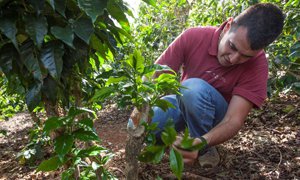
Juan Diego Román has seen the Nespresso AAA Sustainable Quality™ Program grow from the ground up. Since 2004, the agronomist and Nespresso Green Coffee Project Manager from Costa Rica has worked together with farmers, suppliers and agronomists to create awareness about the AAA Program and implement best farming practices throughout Central America. On the occasion of the 10th year anniversary of the AAA Program, he shares his insights on the challenges and the rewards of working with the program.
How would you describe the Nespresso AAA Sustainable Quality™ Program in a nutshell?
The Nespresso AAA Program aims to increase the sustainable, quality production of coffee.
Based in Costa Rica, you are the Nespresso AAA Program Manager for Central America. What does your work entail?
My job is essentially to create awareness of and to implement the Nespresso AAA Program in Central America, at all levels. I deal with farmers, suppliers and agronomists…all the way up to the Nespresso management.
Can you describe the early years of the AAA Program?
I joined the AAA Program in 2004 with the task of implementing it in Latin America. At the beginning we had a more operational focus. The AAA Program had been announced in the fall of 2003 and it was just beginning. Initially we were three people on the ground: myself, an agronomist from our coffee supplier ECOM in Costa Rica and the head agronomist of our coffee supplier Expocafé in Colombia. Ten years later, we now have a core team of eight, along with agronomists on the field in Costa Rica, Guatemala, Mexico and Nicaragua. We also work with various local and international partners to support farmers implementing sustainable coffee farming practices through technical assistance and training, invest in infrastructures and realize different projects in these countries. In the first year, we started with a small group of visionary farms. But then, in the following years, we kept recruiting more and more farmers. In Central America and Mexico alone this has grown to over 7,000 farms participating in the AAA Program, out of the 52,000 that were part of the program worldwide at the end of 2012.

How has your work evolved since then?
From 2004 to 2006 I worked closely with the Rainforest Alliance team led by Chris Wille, Chief of the Sustainable Agriculture Program (SAN), to develop the unique Nespresso methodology, TASQ™ – the Tool for the Assessment of Sustainable Quality™ – which we use to implement the AAA Program. TASQ™ allows farmers to benchmark their farm performance against a comprehensive set of rigorous social, environmental and quality criteria. The results are verified by the Rainforest Alliance and our Sustainable Agriculture Network (SAN) partners. Together with Nespresso agronomists, farmers then develop a plan to work towards coffee production that is socially, environmentally and economically sustainable.
These days, my job has a more strategic focus, exploring how the AAA Program can engage in new partnerships and projects. But I am still involved in the day-to-day management of projects through close contact with our agronomists. And I love getting out of the office and onto the farms!
How would you describe the work you do with the farmers in the AAA Program?
Respect and relationship building are at the core of our work with the farmers in the program. Our agronomists, who are trained by Nespresso and our sustainability partner, the Rainforest Alliance, provide the direct link between the AAA Program and the farmers. Their job is to help farmers make improvements to their farm’s sustainability, coffee quality and productivity, using the language of the farmers. Respect is key. Ultimately, farmers know more about coffee. They have worked with it all their lives, often for generations.
And they are human beings, who need relationships and trust in order to try something new. While it may only take ten minutes to explain your recommendations to improve their farm, you might have to spend one or two hours in informal conversation beforehand. Visiting the farms regularly is important not only for assessments, but to demonstrate our genuine interest in their livelihood.
What is required of farmers who join the AAA Program?
First of all, in order to join the AAA Program, farmers must belong to a Nespresso-approved AAA cluster, whose unique combination of soil, altitude, coffee variety, and vegetation creates a specific coffee taste and character profile.
After this, what farmers need the most is their own commitment. A self-assessment using TASQ™ is just the beginning. Farmers must be willing to actively improve the conditions of their farm, which eventually might mean drastically changing their farm management approach.
While meeting certain standards to achieve Rainforest Alliance certification is one element of the program, the AAA Program is more than that. It is an on-going process, in which improvements, not only in sustainability, but also in quality, occur step by step.
What is the greatest challenge you encounter in implementing the AAA program?
 Gaining the trust of the farmers is one of the biggest challenges. It is often hard to change the ways of someone who has been doing the same thing in the same way for decades. While some farmers understand the program’s benefits immediately, some farmers are not interested at all. Others join the program for the financial gain, but resist improving their way of working, and then leave the program. But overall, farmers remain very loyal to the program, especially once they see how their farms and livelihoods begin to change for the better, even after a relatively short time.
Gaining the trust of the farmers is one of the biggest challenges. It is often hard to change the ways of someone who has been doing the same thing in the same way for decades. While some farmers understand the program’s benefits immediately, some farmers are not interested at all. Others join the program for the financial gain, but resist improving their way of working, and then leave the program. But overall, farmers remain very loyal to the program, especially once they see how their farms and livelihoods begin to change for the better, even after a relatively short time.
This is why using concrete examples is also very important in our work. Farmers already work closely with nature. By drawing their attention to the interconnections – between the soil, water and birds – we can help them realise that sustainable farming is not only good for the environment but also profitable for them in the long run.
For example, a farmer with a small river running through his property will be required to maintain a buffer zone – where trees and other vegetation are planted or left to grow in their natural state to help control air, soil and water quality, secure wildlife habitats and encourage biodiversity. The farmer might argue that this would sacrifice space otherwise used for planting coffee. But one can then point out that planting coffee so close to the river will also make it more susceptible to diseases and that the plant will produce less. That is a reason that the farmer will understand.
What is the most rewarding part of your job?
It makes me very happy when farmers, after two or three years of participation in the AAA Program, take the initiative of showing me all the improvements they have made on their farm. They are proud of what they have achieved. Many farmers have been able to improve their lives in general – by making their homes larger, buying a car to transport their own coffee and sending their children to high school and university. This success is directly linked to the improvements in productivity made through the AAA Program.
What AAA Program achievement are you most proud of?
I am very proud of how we have been able to help farmers improve their business skills through a program realised in cooperation with Root Capital in Huehuetenango, Guatemala. We launched the program in 2010 and it was so successful that it was extended until 2012. The program focused on record keeping, balancing budgets and helping farmers find the best options to invest their money. This inspired us to develop a similar initiative in Costa Rica.

And what is your most memorable experience with the AAA Program?
A few years ago, an older farmer, close to 60 years old, came up to me at a farmers’ meeting and said, “I must confess: I joined the AAA Program and carried out all the recommendations not because I believed in them, but just to prove you wrong. But I was the one who was wrong. After only 6 months, I could see that the recommendations were already helping.” The farmer has since retired and his son has taken over the farm. And they have become model participants in the AAA Program.
Where do you see the AAA Program in another 10 years?
I see the program providing more AAA coffee, of course. By then we will have reached most of our goals concerning sustainability and quality. So a key focus will be on improving the accountability and managing skills of farmers, helping them to become more business-oriented.
